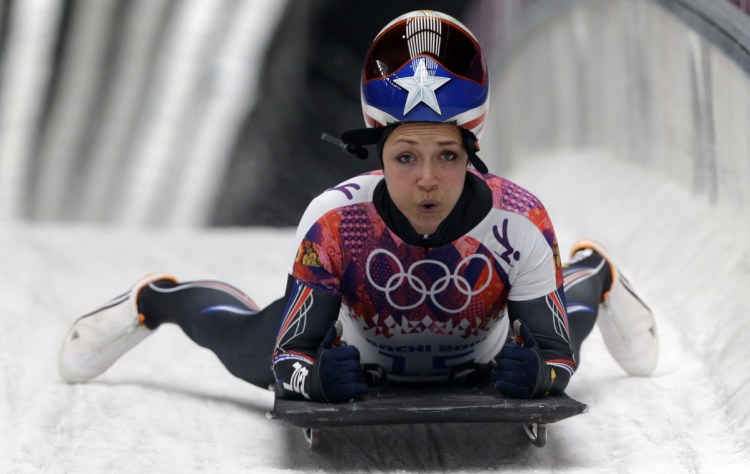PYEONGCHANG, South Korea — It was the morning after Katie Uhlaender arrived in South Korea for the Winter Olympics, her fourth as a U.S. skeleton racer. She was tired, jet-lagged, disoriented from crossing the Pacific Ocean and international date line.
Then she noticed a Facebook post in broken English from someone she didn’t know in Russia: Better watch your back when coming home from training you (expletive).
Then another: You make my heart (vomit).
Then another: Dumb (expletive) from scum country.

Katie Uhlaender
Then another: Your medal is wood.
Another from an unknown sender linked to an article on a Russian website. She wrote back that, sorry, she doesn’t read Russian. The reply: Your place is fourth.
Uhlaender’s heart sank. She wasn’t dreaming, wasn’t in some sort of woozy, hallucinatory state. She knew exactly what had happened. The bronze medal – her bronze medal – was gone.
“A huge gut punch,” she says.
The Court of Arbitration for Sport had overturned the International Olympic Committee’s November decision to issue lifetime bans to 28 Russian athletes linked to the heinous Sochi doping scandal and erase their results from the 2014 Winter Games. Uhlaender had finished fourth in Sochi behind Elena Nikitina of Russia – by four-hundredths of a second after four runs – and was elevated to third when Nikitina was banned.
For 70 days.
The CAS decision last week reinstated the Sochi results, returning Nikitina to third. The woman who overcame 12 surgeries, the death of her father, the death of her best friend and her own near death in pursuit of five-ring salvation was back in fourth by four-hundredths of a second.
The pebble was crushed by the wheels of bureaucracy, the collateral damage from a turf war at the highest levels of international sport, the innocent bystander gunned down in the crossfire.
The person who took the brunt while the suits adjourned their meetings and headed to their 5-star hotels.
“When the IOC took such a strong stance to ban Russia and suspend the federation completely, and strip the medals,” Uhlaender said, “it gave hope to the athletes who were holding onto the spirit of sport. And when CAS took that away, it did the opposite. We’re holding onto an Olympic spirit that feels like it’s dying.”
The ultimate crime, of course, is few people embody that spirit of perseverance and courage more than Uhlaender.
She’s been racing in the anonymous sport of skeleton, a one-person sled going head-first down a sleep, icy, curving track, since 2003 and finished a promising sixth in the 2006 Winter Games. Then she shattered her kneecap in a snowmobile accident and required four surgeries.
Then her father, former baseball outfielder Ted Uhlaender, died of a heart attack while Katie was competing in a World Cup event. She wears his National League Championship Series ring from the 1972 Cincinnati Reds around her neck on a chain.
There would be eight more surgeries, on her left foot, her left ankle, her right knee, her left hip, her stomach, her liver. In 2016 an auto-immune disease nearly killed her. Last May she hadn’t heard from her best friend and gold-medal bobsledder, Steve Holcomb. She went to his room at the Olympic training center in Lake Placid, New York, and discovered his body. An autopsy found sleeping pills and alcohol in his system, a possible suicide.
Through it all she continued chasing her Olympic dream, even flirting with weight lifting and track cycling in a bid to compete in the Summer Games as well. She was 11th in 2010, then an agonizing fourth in Sochi.
Soon reports began to surface about a nefarious scheme by the Russians, pumping athletes with a powerful cocktail of detectable, banned substances but drilling a hole in the Olympic doping lab and swapping out dirty for clean urine before tests could be conducted.
The director of the lab ultimately defected to the United States and came clean about being dirty, providing names, dates, substances, details. A whistleblower leaked an electronic database from the Russian lab that corroborated his allegations. Two investigative reports from the World Anti-Doping Agency found overwhelming evidence of state-sponsored, systemic doping, as did separate IOC commissions.
By November, Uhlaender had a “3” next to her name in the Sochi results and there was talk of reallocation medal ceremonies for effected athletes during these Games, or maybe a private ceremony in their hometowns, or perhaps even with the IOC president at the Olympic Museum in Lausanne, Switzerland.
“I was assured by multiple people it was a done deal, it was real,” Uhlaender said. “People were like, ‘Congratulations, you’re a bronze medalist.’ I was like: ‘Wait, am I?’ Because I didn’t have it. I was trying to focus on the fact it was a great step in a bigger sense for the Olympic movement. I can’t tell you the weight it lifted from all of our shoulders, to know they weren’t going to get away with a state-wide doping system.
“I don’t think anyone saw this CAS decision coming.”
Your medal is wood. Your place is fourth.
She has tried to block it out, tried to focus on what, at 33, could be her last Olympics.
It’s hard. “I’m a human being,” Uhlaender said. “I have emotions.”
Send questions/comments to the editors.



Success. Please wait for the page to reload. If the page does not reload within 5 seconds, please refresh the page.
Enter your email and password to access comments.
Hi, to comment on stories you must . This profile is in addition to your subscription and website login.
Already have a commenting profile? .
Invalid username/password.
Please check your email to confirm and complete your registration.
Only subscribers are eligible to post comments. Please subscribe or login first for digital access. Here’s why.
Use the form below to reset your password. When you've submitted your account email, we will send an email with a reset code.